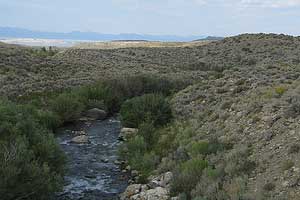Rush Creek flows towards Mono Lake in the distance. Photo by Chris Austin.
Late winter storms and a heavy snow pack kept Tioga Pass closed weeks later than normal this year. That’s not necessarily something you want to hear if you live in the little mountain town of Lee Vining where residents wait expectantly for Tioga Pass, their major thoroughfare to the West, to open every year. But Lee Vining residents are getting a special treat this year. All that snow that kept Tioga Pass closed so long is melting and causing the level of Mono Lake, the life blood of Lee Vining, to rise.
Mono Lake has a troubled history and is a victim of the great California water wars of the early 1900s. During the early part of last century Los Angeles needed water to grow. An inauspicious plan was launched to divert water from Eastern Sierra lakes and the Owens River and channel it through aqueducts to storage basins around the Los Angeles area giving L.A. the water it needed to grow.
After years of water diversion that nearly destroyed Mono Lake’s ecosystem completely, environmental advocates in the 1980s were finally able to convince the state officials that Mono Lake was a rare gem that should be saved and complete diversion of the streams that feed Mono Lake was halted. Since then a steady flow of water has been allowed to enter the lake raising it little by little.
Over the last few weeks Mono Lake has seen the benefit of this years overly wet winter as many of the surrounding lakes used by LADWP and SCE to send water to L.A. and generate power have filled overcapacity adding extra water to that which flows into Mono Lake on a normal year. Already this year Mono Lake has risen over a quarter of a foot since June 1st and is currently rising about an inch a week. Currently the level of Mono Lake is 6,382ft, the second highest recorded level for the lake since the plan to refill the lake was enacted.
To find out more about Mono Lake and what you can do to help protect its rare beauty visit the Mono Lake Committee at MonoLake.org

